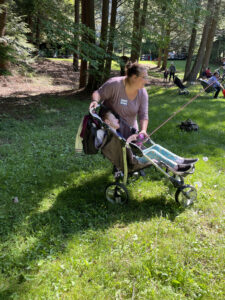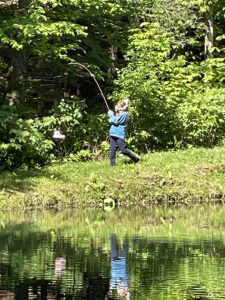The Division of Ecological Restoration (DER) is a division of the Massachusetts Department of Fish and Game within the Executive Office of Energy and Environmental Affairs. DER was created in 2009 with the merger of the Riverways and Wetlands Restoration Programs (formally within the Massachusetts Office of Coastal Zone Management). DER coordinates ecological restoration to improve ecological condition and to restore important ecosystem services that improve the quality of life for all Massachusetts citizens.
DER helps restore and protect rivers, wetlands, and watersheds in Massachusetts for the benefit of people and the environment. DER works with partners from municipalities, nonprofits, government agencies, and other organizations to accomplish its restoration goals. Some benefits and accomplishments in 2023, as detailed in its Annual Report, are as follows:
Storm Protection & Reduced Flood Risk
DER’s ecological restoration work protects communities by increasing climate resilience through storm protection and reduced flood risk. Along the coast, DER restores wetlands and salt marshes, which provide a natural barrier to storms by absorbing flood waters and decreasing wave energy, protecting nearby communities. In the western part of the state, Massachusetts experienced severe flooding in the summer and fall of 2023, which resulted in undersized culverts unfortunately contributing to road flooding and failures. DER’s Culvert Replacement Municipal Assistance (CRMA) Grant Program helps municipalities replace undersized and deteriorated culverts with larger and more resilient structures. Installing culverts that meet the Massachusetts Stream Crossing Standards allows rivers to flow unrestricted and lowers the risk of flood damage.
Healthy Infrastructure & Public Safety
Many municipalities are confronted with aging and deteriorating culverts and dams, paired with increasing costs to maintain them. DER’s Dam Removal and Stream Continuity Programs work with partners to remove dams and replace undersized and deteriorating culverts with those that meet the Massachusetts Stream Crossing Standards. This work improves public safety and helps municipalities address rising maintenance costs. Although replacing culverts with structures that meet these standards involves more up-front cost, it is less expensive over the lifespan of the structure than inaction or in-kind replacements.
Biodiversity
Creating free-flowing, healthy rivers and wetlands not only benefits our communities, but also improves habitat to support diverse and rare species found throughout the Commonwealth. In 2023, the Healey-Driscoll Administration helped prioritize and bring awareness to this by signing an Executive Order to develop new biodiversity goals for a nature-positive future. Ecological restoration supports biodiversity by revitalizing habitats for a variety of wildlife, including many endangered and threatened plant, fish, and animal species.
Recreational Opportunities
DER’s restoration projects often result in new natural areas for the public to enjoy or improvements to existing conservation land. This work also improves public safety at many of these sites. Massachusetts has many beautiful natural spaces and continuing to restore rivers, wetlands, and watersheds will ensure future generations can enjoy them.
In 2023, they were involved in the following:
Projects:
- 11 projects under construction
- 3 projects completed
- 66 Priority Projects in planning, design, permitting, or construction
Infrastructure:
- 3 dams removed in Braintree and Bridgewater
- 3 culverts upgraded in Ashfield, Plymouth, and Washington
Benefits
- 2 river miles reconnected
- 40 acres of freshwater wetlands restored
- 594 acres of river herring spawning habitat now accessible
In the last five years, DER has doubled in size, and has rapidly expanded its restoration programs in response to the demand for assistance. Now, DER is restructuring its programs to better meet the restoration needs of municipalities, non-profit organizations, and landowners. As a young agency, DER is building a solid operational foundation that will serve the Division of Fisheries and Wildlife and its partners for many years to come.
DER is excited for all that’s coming in 2024, including some of these anticipated activities:
- It will issue its annual Request for Responses for municipalities that want to upgrade undersized or failing culverts through the Culvert Replacement Municipal Assistance (CRMA) Grant Program.
- It will expand the Regional Restoration Partnerships Program by issuing a new request for responses to establish new Restoration Partnerships.
- It will continue to oversee over 50 active projects as part of the Priority Projects Program. In addition, DER intends to issue a request for responses to award Priority Project status to new projects, making them eligible for support from DER in the form of grant eligibility, technical assistance, and contracted technical services.
- It will complete preliminary design studies for seven potential dam removal projects. DER awarded $350,000 to support these studies in December 2023.
- It will begin preliminary design studies to replace near-coastal waterway crossings (such as culverts or bridges) that are expected to be impacted by sea-level rise and increased storm surge due to climate change. Addressing this type of crossing presents a new set of challenges.
- It issued a Request for Responses to identify potential project locations in need of preliminary studies in 2023 and anticipates selecting sites in 2024.
- It anticipates completing construction on at least seven cranberry bog restoration, dam removal, wetland restoration, and culvert replacement projects.
Youth Outreach Derby
On June 1, some 25 youths and their families attended the Berkshire County League of Sportsmen’s (BCLS) Youth Outreach Fishing Event this year at Reynolds Pond in Cheshire. This year’s group was from the Pediatric Palliative Care Program, part of Hospice Care in the Berkshires which is sponsored by the Department of Public Health. It is a separate program from Hospice Care for kids who have life limiting health conditions.
The program is about giving the kids and their families a quality of life. They provide nursing, social work, spiritual counselling, art therapy, music therapy and other therapies. The siblings get to benefit from them as well because they do family events. “Most of the kids get their medical care at Boston Children’s Hospital. They have nurses who come to their homes and talk about what’s going on and discusses plans for doctor events. They have social workers who help connect the families to all of the resources that are available to them such as social security, mental disability services, fuel assistance, housing, anything to help the families.
The kids, along with their parents and grandparents, were eager to attend and learn how to fish at Reynolds Pond. Most never have been fishing before and it was a brand new experience for them. It was such a great way for kids and families to connect outside of school. These kids had a ball and were in their element.
The BCLS was more than happy to provide comfort to these kids that are medically challenged. There was a wide variety of kids, some were in wheelchairs – and kids who look like any other kids but with conditions that may very well limit their lifespans. Kids with seizure disorders, with cancer, and all kinds of different challenges.
Reynolds Pond was stocked and the kids were guaranteed that they would catch fish. And boy did they! For a change, the fish cooperated and they caught lots of good- sized brook trout, keeping the fish cleaning volunteers quite busy.
Each kid was given a fishing pole and equipment with which to fish and when the day was over, they were able to take them along with their trout home. Their equipment was all set up by volunteers by the time they arrived and they were provided with the necessary bait. Around noon time, a meal of burgers, dogs, chips, drinks and desert was provided.
The BCLS annually sponsors the event with significant grants from the local chapter of Whitetails Unlimited. They provided the brook trout (which were raised in the Berkshire National Fish Hatchery), equipment, bait, and food. Volunteers from the Cheshire Rod & Gun Club, East Mountain Sportsmen’s Club, Adams Outdoor for Youth, B.A.S.S., Taconic Chapter of Trout Unlimited, Berkshire Beagle Club and Pittsfield Sportsmen’s Club assisted.
God bless the kids, their families and many thanks to the sportsmen and women who provided them with such an enjoyable and memorable day.
Firearm course just for women
The Stockbridge Sportsmen’s Club is offering a MA firearm license course for women only on Saturday, June 29. The course will run from 9:00 AM until 2:30 PM. The fee is $ 160.00 which includes eye and ear protection that they keep. Live fire is included.
For more information, email Robert at robmcdermott@verizon.net.
Questions/comments: Berkwoodsandwaters@gmail.com. Phone: (413) 637-1818


